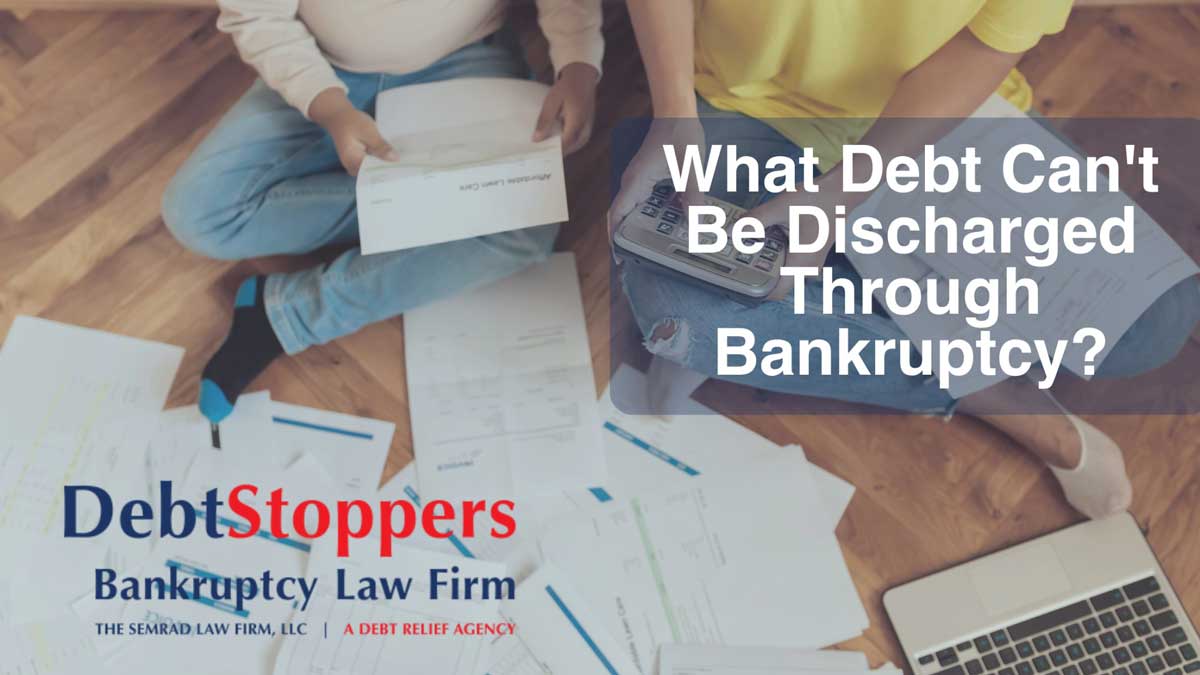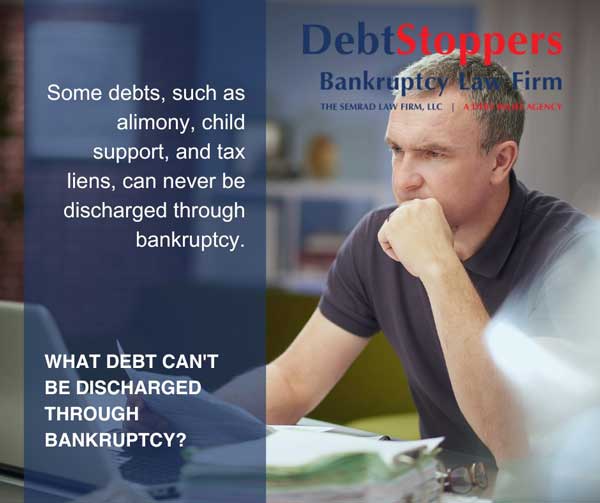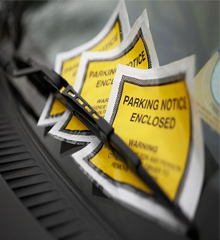What Debt Can't Be Discharged Through Bankruptcy?

When you’re facing financial challenges, your debts can feel like a burden that constantly weighs you down. And when you're struggling to keep up with payments, filing for Chapter 7 or 13 bankruptcy can help you get the debt relief you need.
However, it is important to understand that not all debt is eligible for discharge. Whether or not a particular obligation can be eliminated depends on a variety of factors, including the type of creditor involved. So before you make any decisions, talk to an attorney about the kinds of bills you can and cannot discharge.

Debts That Can Never Be Discharged Through Bankruptcy
When you file for Chapter 7 or Chapter 13, you are not automatically relieved of all of your debt.
Some debts, such as alimony, child support, and tax liens, can never be discharged through bankruptcy. This means you will still be responsible for making these payments even after filing.
Common types of non-dischargeable debt include:
-
Tax liens and unqualified tax debt
-
Spousal or child support payments
-
Alimony payments
-
Court judgments for willful and malicious injuries you caused
-
Court judgments for personal injury you caused by driving a motor vehicle while intoxicated
-
Anything you did not include in your petition
If you are considering Chapter 7 or 13 as a way to get out from under your debt, it's important to talk to an attorney about which obligations you can discharge. An experienced attorney can help you understand what is eligible for discharge and come up with a plan for any payments you can’t include in your bankruptcy filing.
Debts That are Difficult To Discharge in Bankruptcy
There are a number of debts that are difficult, but not impossible, to discharge in Chapter 7 and Chapter 13. Student loans and taxes are two examples of obligations that often cannot be eliminated. However, there are instances where each type of debt can be discharged.
Student Loans
In general, student loans cannot be eliminated unless it can be proven that repayment would cause an “undue hardship” to the debtor. As a result, the discharge of student loan debt has historically been extremely difficult to obtain, even with the help of a skilled attorney.
Although there are limited cases in which student loans have been discharged through Chapter 7 or 13 bankruptcy, this was rare and usually only applied to borrowers who can prove severe financial hardship.
However, on Thursday, November 17, 2022, the Department of Justice and the Department of Education announced a “fairer and more accessible bankruptcy discharge process” for student loans. These changes make it easier to prove “undue hardship,” hopefully allowing more borrowers to receive the debt relief they need.

Income and Property Taxes
Likewise, while many tax bills are not dischargeable, you may be able to eliminate some taxes by filing for Chapter 7 or 13 bankruptcy. For instance, property taxes that are more than one year old can be discharged, although any associated tax liens will remain.
You can also discharge some state and federal income taxes when certain conditions are met. First, the debt must be at least three years old, and you must have filed a tax return at least two years before filing. Additionally, the tax debt must have been assessed 240 or more days before you submitted your petition or must not have been assessed yet.
Hire a Professional Bankruptcy Attorney
Filing for Chapter 7 or Chapter 13 bankruptcy can be a difficult decision, but it is often the best option for people who are struggling with overwhelming debt. Even though there are some debts that can’t be discharged through bankruptcy, for most families, it is still the most comprehensive and long-term solution available.
A knowledgeable attorney can explain which of your obligations can be included in your filing, help you decide between Chapter 7 and Chapter 13, and provide guidance through the entire process. By working with an attorney, you can ensure that your case is handled efficiently and effectively.
There’s no reason to wait any longer to get the relief you need. Request your free consultation today to schedule a free consultation with a qualified DebtStoppers attorney in your area.





